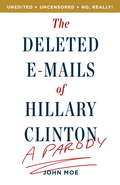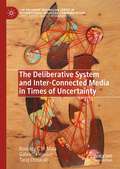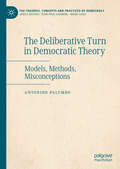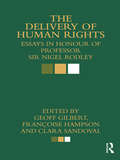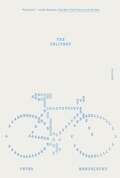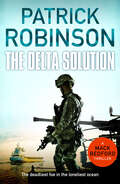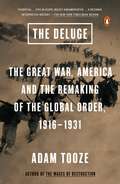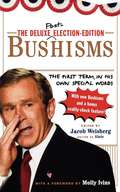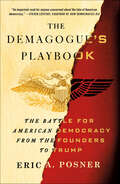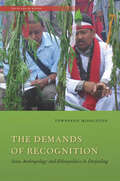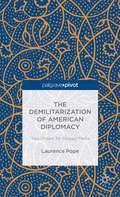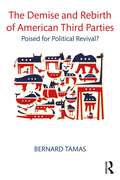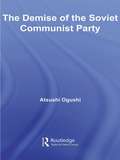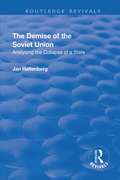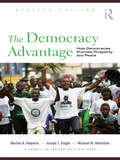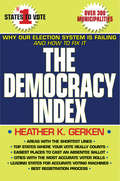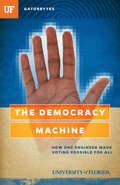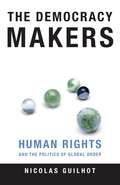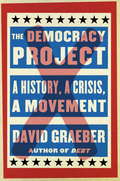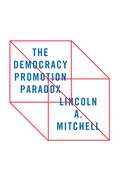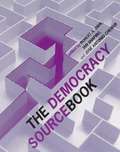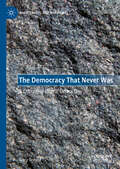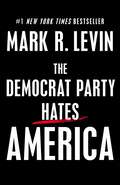- Table View
- List View
The Deleted E-Mails of Hillary Clinton
by John MoeThe explosive secret e-mails Hillary Clinton doesn't want you to read (Or maybe she does...She's crafty like that.) Remember that time Hillary Clinton admitted that she deleted thousands of e-mails from her ultra-secret personal e-mail address while Secretary of State? Thousands of e-mails, she claimed, about her daughter's wedding? Well, people aren't buying it: "Hiding the truth" says The New York Post. "Conspiracy or incompetence?" asks Al-Jazeera. "Hillary Clinton Don't Give a Sh*t" claims Wonkette. Clearly, these e-mails need to be released immediately. Now, thanks to John Moe and WikiLoox, the lost messages have been retrieved and placed in this dossier. For the first time, we'll get a look inside HRC's well-coiffed head, reading intimate conversations with family (Bill, Chelsea), friends (Ruth Bader Ginsburg, Oprah, Beyonce), and frenemies (Obama, Palin, Putin) alike. We'll also learn essential details about her private life, from her pop-culture obsessions to her thoughts on yoga, baking cookies, "Scandal," and much more. Make no mistake--this is a book of critical national importance. Following her journey from mother-of-the-bride to commandress-in-chief, we'll see how HRC handles the most challenging situations she might face in the White House, including how to respond to people who "reply all" to e-mails and how to wrangle pantsuit retailers as they compete, with increasing desperation, for her attention. Along the way, we will finally get the portrait we need--the one our country deserves--of the woman we may soon call "Madam President." From the Trade Paperback edition.
The Deliberative System and Inter-Connected Media in Times of Uncertainty (The Palgrave Macmillan Series in International Political Communication)
by Rousiley C. Maia Gabriella Hauber Tariq ChoucairAdopting a systemic perspective, this book explores media-based communication and reason-giving as a linkage process that transcends time and space. Arguments, reasoning perspectives and emotional concerns link elites’ and citizens’ political judgement within and across a set of interrelated arenas in the political system.
The Deliberative Turn in Democratic Theory: Models, Methods, Misconceptions (The Theories, Concepts and Practices of Democracy)
by Antonino PalumboThirty years of developments in deliberative democracy (DD) have consolidated this subfield of democratic theory. The acquired disciplinary prestige has made theorist and practitioners very confident about the ability of DD to address the legitimacy crisis experienced by liberal democracies at present at both theoretical and practical levels. The book advance a critical analysis of these developments that casts doubts on those certainties -- current theoretical debates are reproposing old methodological divisions, and are afraid to move beyond the minimalist model of democracy advocated by liberal thinkers; democratic experimentation at the micro-level seems to have no impact at the macro-level, and remain sets of isolated experiences. The book indicates that those defects are mainly due to the liberal minimalist frame of reference within which reflection in democratic theory and practice takes place. Consequently, it suggests to move beyond liberal understandings of democracy as a game in need of external rules, and adopt instead a vision of democracy as a self-correcting metagame.
The Delivery of Human Rights: Essays in Honour of Professor Sir Nigel Rodley
by Geoff GilbertThe Delivery of Human Rights reflects on two overlapping issues in international human rights law: how can existing norms be better implemented and effected, and how can other branches of international law or other international actors be used so as to provide an improved delivery of those norms. Rather than simply looking at the content of the rights, this book will also explore how the framers’ intention that individuals benefit from the norms can be achieved. The book is written and published in honour of Professor Sir Nigel Rodley KBE. It celebrates his career as an academic and practitioner in the area of human rights. Professor Rodley acted as the UN Special Rapporteur on Torture from 1993 to 2001 and is currently a member of the UN Human Rights Committee. He is also a member of the International Commission of Jurists. Since 2001 he has been a Member of the UN Human Rights Committee, established under the International Covenant on Civil and Political Rights. In 1998 he was knighted in the Queen's New Year's Honours list for services to Human Rights and International Law and in 2000 he received an honorary LLD from Dalhousie University. He is Professor and Chair of the Human Rights Centre, University of Essex, having taught there since 1990. The contributors to this volume are notable experts in the area of human rights law and include Paul Hunt, Malcolm Evans, Michael O’Flaherty and David Weissbrodt. The book addresses such topics as the Role of Special Rapporteurs, how can the absolute prohibition of torture be properly implemented, Responsibility to Protect, non-state actors, including businesses, and human rights.
The Delivery: A Novel
by Peter MendelsundEnter the world of the Delivery Boy, who must peddle his way to 5-star customer ratings—and, perhaps, freedom—in novelist and graphic designer Peter Mendelsund’s The Delivery.Countries go wrong, sometimes, and sometimes the luckier citizens of those countries have a chance to escape and seek refuge in another country—a country that might itself be in the process of going wrong.In the bustling indifference of an unnamed city, one such citizen finds himself trapped working for a company that makes its money dispatching an army of undocumented refugees to bring the well-off men and women of this confounding metropolis their dinners. Whatever he might have been at home, this citizen is now a Delivery Boy: member of a new and invisible working class, pedaling his power-assist bike through traffic hoping for a decent tip and a five star rating.He is decidedly a Delivery Boy; sometimes he even feels like a Delivery Baby; certainly he's not yet a Delivery Man, though he'll have to "man-up" if he wants to impress N.—the aloof dispatcher who sends him his orders and helps him with his English.Can our hero avoid the wrath of his Supervisor, get the girl, and escape his indentured servitude? Can someone in his predicament ever get a happy ending? Who gets to decide? And who's telling this story, anyway?Harrowing and hilarious, The Delivery is a fable for and about our times: an exploration of the ways language and commerce unites and isolates every one of us, native and immigrant both.
The Delta Solution (The Mack Bedford Military Thrillers)
by Patrick RobinsonAn ex–Navy SEAL goes head-to-head with Somali pirates in this explosive military thriller by a #1 New York Times–bestselling author. Operating out of the Indian Ocean, a heavily armed and professional team of Somali pirates, known as the &“Somali Marines,&” have been capturing large cargo ships in order to ransom them for huge sums of money, enraging the Pentagon. Tensions reach boiling point after they seize two United States ships, and demand fifteen million dollars. Against all advice, the ship owners pay up, causing the US military to form an elite hit squad, charged with eliminating the pirates&’ operation. Battle-hardened veteran Mack Bedford is deployed to SEAL Team 10 to form the Delta Platoon. His objective: to go the Indian Ocean and obliterate the Somali Marines once and for all. Praise for The Delta Solution&“The high-action thriller lives on. Here is a rare tale that&’s not only ripped-from-the-headlines timely, but also so elegantly structured as to evoke comparisons with masters like Vince Flynn, Steve Berry, and James Rollins. An instant, surefire classic that is not to be missed.&” —Jon Land, bestselling author of Strong Justice&“Readers will cheer as Mack and his team solve the vexing problem of Somali pirates.&” —Publisher&’s Weekly
The Deluge: The Great War, America and the Remaking of the Global Order, 1916-1931
by Adam ToozeWinner of the Los Angeles Times Book Prize - HistoryFinalist for the Kirkus Prize - NonfictionA searing and highly original analysis of the First World War and its anguished aftermath In the depths of the Great War, with millions dead and no imaginable end to the conflict, societies around the world began to buckle. The heart of the financial system shifted from London to New York. The infinite demands for men and matériel reached into countries far from the front. The strain of the war ravaged all economic and political assumptions, bringing unheard-of changes in the social and industrialorder. A century after the outbreak of fighting, Adam Tooze revisits this seismic moment in history, challenging the existing narrative of the war, its peace, and its aftereffects. From the day the United States enters the war in 1917 to the precipice of global financial ruin, Tooze delineates the world remade by American economic and military power. Tracing the ways in which countries came to terms with America's centrality--including the slide into fascism--The Deluge is a chilling work of great originality that will fundamentally change how we view the legacy of World War I.From the Hardcover edition.
The Deluxe Election Edition Bushisms
by Molly Ivins Jacob WeisbergThe Bush era has been a special time -- for the deficit (back, and larger than ever), for the countries formerly known as our allies, and for the English language. Here it all is, straight from the horse's, er, mouth. With new Bushisms coming fast and furious in this election season, ace Bushism editor Jacob Weisberg offers a must-read compendium and "explanation" of the first term. Read President Bush's eye-popping description of his economic policy: "See, without the tax relief package, there would have been a deficit, but there wouldn't have been the commiserate -- not 'commiserate' -- the kick to our economy that occurred as a result of the tax relief." Got that? How about this analysis of the weapons proliferation problem, from the man with his finger on the Button: "Free nations don't develop weapons of mass destruction." Or his belief in the importance of staying connected to us all: "[A]s you know, these are open forums, you're able to come and listen to what I have to say." The Deluxe Edition also includes reality checks: coherent Bush statements about major issues that bear no relation to the truth. The Deluxe Election-Edition Bushisms is essential reading for everyone still wondering what the past four years have all been about.
The Demagogue's Playbook: The Battle for American Democracy from the Founders to Trump
by Eric A. PosnerA New York Times Book Review Editor's PickWhat Happens to Democracy When a Demagogue Comes to Power?"It is hard to imagine understanding the Trump presidency and its significance without reading this book.” —Bob Bauer, Former Chief Counsel to President Barack ObamaWhat—and who—is a demagogue? How did America’s Founders envision the presidency? What should a constitutional democracy look like—and how can it be fixed when it appears to be broken? Something is definitely wrong with Donald Trump’s presidency, but what exactly? The extraordinary negative reaction to Trump’s election—by conservative intellectuals, liberals, Democrats, and global leaders alike—goes beyond ordinary partisan and policy disagreements. It reflects genuine fear about the vitality of our constitutional system. The Founders, reaching back to classical precedents, feared that their experiment in mass self-government could produce a demagogue: a charismatic ruler who would gain and hold on to power by manipulating the public rather than by advancing the public good. President Trump, who has played to the mob and attacked institutions from the judiciary to the press, appears to embody these ideas. How can we move past his rhetoric and maintain faith in our great nation? In The Demagogue’s Playbook, acclaimed legal scholar Eric A. Posner offers a blueprint for how America can prevent the rise of another demagogue and protect the features of a democracy that help it thrive—and restore national greatness, for one and all. “Cuts through the hyperbole and hysteria that often distorts assessments of our republic, particularly at this time.” —Alan Taylor, winner of the 2014 Pulitzer Prize for History
The Demands of Recognition: State Anthropology and Ethnopolitics in Darjeeling
by Townsend MiddletonSince the British colonial period anthropology has been central to policy in India. But today, while the Indian state continues to use ethnography to govern, those who were the "objects" of study are harnessing disciplinary knowledge to redefine their communities, achieve greater prosperity, and secure political rights. In this groundbreaking study, Townsend Middleton tracks these newfound "lives" of anthropology. Offering simultaneous ethnographies of the people of Darjeeling's quest for "tribal" status and the government anthropologists handling their claims, Middleton exposes how minorities are--and are not--recognized for affirmative action and autonomy. We encounter communities putting on elaborate spectacles of sacrifice, exorcism, bows and arrows, and blood drinking to prove their "primitiveness" and "backwardness. " Conversely, we see government anthropologists struggle for the ethnographic truth as communities increasingly turn academic paradigms back upon the state. The Demands of Recognition offers a compelling look at the escalating politics of tribal recognition in India. At once ethnographic and historical, it chronicles how multicultural governance has motivated the people of Darjeeling to ethnologically redefine themselves--from Gorkha to tribal and back. But as these communities now know, not all forms of difference are legible in the eyes of the state. The Gorkhas' search for recognition has only amplified these communities' anxieties about who they are--and who they must be--if they are to attain the rights, autonomy, and belonging they desire.
The Demilitarization of American Diplomacy: Two Cheers for Striped Pants
by Laurence PopeLaurence Pope describes the contemporary dysfunction of the State Department and its Foreign Service. He contends that in the information age diplomacy is more important than ever, and that, as President Obama has stressed, without a change of thinking the U. S. may be drawn into more wars it does not need to fight.
The Demise and Rebirth of American Third Parties: Poised for Political Revival?
by Bernard TamasVirtually all academic books on American third parties in the last half-century assume that they have largely disappeared. This book challenges that orthodoxy by explaining the (temporary) decline of third parties, demonstrating through the latest evidence that they are enjoying a resurgence, and arguing that they are likely to once again play a significant role in American politics. The book is based on a wealth of data, including district-level results from US House of Representatives elections, state-level election laws after the Civil War, and recent district-level election results from Australia, Canada, India, and the United Kingdom.
The Demise of the Soviet Communist Party (BASEES/Routledge Series on Russian and East European Studies)
by Atsushi OgushiThis book, based on extensive original research in previously unexplored sources, including the party archives, provides a great deal of new information on the disintegration of the Soviet communist party, in 1991 and the preceding years. It argues that, contrary to prevailing views, the party was reformable in late Soviet times, but that attempts to reform it failed: reforms succeeded in preventing the party interfering in the state body, and thereby abolished the party's traditional administrative functions, but without creating an alternative power centre, and without transforming the party from a vanguard party into a parliamentary party. It demonstrates that the party, having ceased to offer career paths for aspiring party members, thereby lost its reason for existence, that an exodus of party members then followed, which in turn caused a financial crisis; and that this financial crisis, and the resulting engagement in commercial activity, fragmented and dispersed party property. It shows how the failed coup of 1991 was led by the military rather than the party, and how having lost its reason for existence and its property, the party had no choice but to accept the reality that it was de facto dead.
The Demise of the Soviet Union: Analysing the Collapse of a State (Routledge Revivals Ser.)
by Jan HallenbergThis title was first published in 2002: Designed as a research text for academics in higher education and interested practitioners, this volume weaves together an original strand of international relations theory with key empirical case studies of the United States, United Kingdom, France and Sweden, and their attitudes towards the Soviet Union. Original in nature and composition, the book deals with aspects of predictability in foreign policy and gauges the level of impact that international events have on domestic levels of awareness. The hypothesis and the typology are solid, giving the book its strong analytical structure. In sum, this book is cutting edge. It will be of great use as a research text to those studying the countries of Western Europe, and also those with an interest in Russia and the Soviet Union. Given its strong theoretical content and its choices of case study, this cross-disciplinary text is also suitable for area studies in general.
The Democracy Advantage: How Democracies Promote Prosperity and Peace
by Michael Weinstein Morton Halperin Joe SiegleReviewing 40 years of hard, empirical data, from China and India to Chile and Iraq, the authors show that poor democracies beat poor autocracies in every economic measure. In addition, the authors offer dramatic evidence that democracies are less likely to fight each other and that terrorists more often find safe haven in authoritarian countries such as Egypt, Saudi Arabia, and Pakistan.
The Democracy Index: Why Our Election System Is Failing and How to Fix It
by Heather K. GerkenDespite howls for reform, the only thing separating us from another election disaster of the kind that hit Florida in 2000, and that almost struck again in Ohio in 2004, may simply be another close vote. In this lucid and lively book, Heather Gerken diagnoses what is wrong with our elections and proposes a radically new and simple solution: a Democracy Index that would rate the performance of state and local election systems. A rough equivalent to the U.S. News and World Report ranking of colleges and universities, the Index would focus on problems that matter to all voters: How long does it take to vote? How many ballots get discarded? How often do voting machines break down? And it should work for a simple reason: no one wants to be at the bottom of the list. For a process that is supposed to be all about counting, U.S. elections yield few reliable numbers about anything--least of all how well the voting system is managed. The Democracy Index would change this with a blueprint for quantifying election performance and reform results, replacing anecdotes and rhetoric with hard data and verifiable outcomes. A fresh vision of reform, this book shows how to drive improvements by creating incentives for politicians, parties, and election officials to join the cause of change and to come up with creative solutions--all without Congress issuing a single regulation. In clear and energetic terms, The Democracy Index explains how to realize the full potential of the Index while avoiding potential pitfalls. Election reform will never be the same again.
The Democracy Machine: How One Engineer Made Voting Possible For All
by University of Florida Jon SilmanDriven to make it possible for people with disabilities to vote like everyone else, engineer Juan Gilbert, a specialist in human-centered computing, spent 10 years perfecting Prime III, software that does just that. His creation has already been tested in the real world and is earning rave reviews from elections supervisors around the country. Gatorbytes highlight for the intellectually curious the world of innovative research happening at the University of Florida. Written by professional journalists, Gatorbytes feature the top research and preeminence work being conducted at the University of Florida, written in a way that’s easy to understand.
The Democracy Makers
by Nicolas GuilhotHas the international movement for democracy and human rights gone from being a weapon against power to part of the arsenal of power itself? Nicolas Guilhot explores this question in his penetrating look at how the U.S. government, the World Bank, political scientists, NGOs, think tanks, and various international organizations have appropriated the movement for democracy and human rights to export neoliberal policies throughout the world. His work charts the various symbolic, ideological, and political meanings that have developed around human rights and democracy movements. Guilhot suggests that these shifting meanings reflect the transformation of a progressive, emancipatory movement into an industry, dominated by "experts," ensconced in positions of power.Guilhot's story begins in the 1950s when U.S. foreign policy experts promoted human rights and democracy as part of a "democratic international" to fight the spread of communism. Later, the unlikely convergence of anti-Stalinist leftists and the nascent neoconservative movement found a place in the Reagan administration. These "State Department Socialists," as they were known, created policies and organizations that provided financial and technical expertise to democratic movements, but also supported authoritarian, anti-communist regimes, particularly in Latin America.Guilhot also traces the intellectual and social trajectories of key academics, policymakers, and institutions, including Seymour M. Lipset, Jeane Kirkpatrick, the "Chicago Boys," including Milton Friedman, the National Endowment for Democracy, and the Ford Foundation. He examines the ways in which various individuals, or "double agents," were able to occupy pivotal positions at the junction of academe, national, and international institutions, and activist movements. He also pays particular attention to the role of the social sciences in transforming the old anti-Communist crusades into respectable international organizations that promoted progressive and democratic ideals, but did not threaten the strategic and economic goals of Western governments and businesses.Guilhot's purpose is not to disqualify democracy promotion as a conspiratorial activity. Rather he offers new perspectives on the roles of various transnational human rights institutions and the policies they promote. Ultimately, his work proposes a new model for understanding the international politics of legitimate democratic order and the relation between popular resistance to globalization and the "Washington Consensus."
The Democracy Makers: Human Rights and the Politics of Global Order
by Nicolas GuilhotNicolas Guilhot looks at how the U.S. government, the World Bank, political scientists, NGOs, think tanks have appropriated the movements for democracy and human rights. His work charts the various symbolic and political meanings that have developed around the movement for human rights and democracy as well their strategic importance for the West. Guilhot suggests that these shifting meanings reflect the transformation of a progressive, emancipatory movement into an industry, dominated by "experts," rather than grassroots leaders.
The Democracy Makers: Human Rights and the Politics of Global Order
by Nicolas GuilhotHas the international movement for democracy and human rights gone from being a weapon against power to part of the arsenal of power itself? Nicolas Guilhot explores this question in his penetrating look at how the U.S. government, the World Bank, political scientists, NGOs, think tanks, and various international organizations have appropriated the movement for democracy and human rights to export neoliberal policies throughout the world. His work charts the various symbolic, ideological, and political meanings that have developed around human rights and democracy movements. Guilhot suggests that these shifting meanings reflect the transformation of a progressive, emancipatory movement into an industry, dominated by "experts," ensconced in positions of power.Guilhot's story begins in the 1950s when U.S. foreign policy experts promoted human rights and democracy as part of a "democratic international" to fight the spread of communism. Later, the unlikely convergence of anti-Stalinist leftists and the nascent neoconservative movement found a place in the Reagan administration. These "State Department Socialists," as they were known, created policies and organizations that provided financial and technical expertise to democratic movements, but also supported authoritarian, anti-communist regimes, particularly in Latin America.Guilhot also traces the intellectual and social trajectories of key academics, policymakers, and institutions, including Seymour M. Lipset, Jeane Kirkpatrick, the "Chicago Boys," including Milton Friedman, the National Endowment for Democracy, and the Ford Foundation. He examines the ways in which various individuals, or "double agents," were able to occupy pivotal positions at the junction of academe, national, and international institutions, and activist movements. He also pays particular attention to the role of the social sciences in transforming the old anti-Communist crusades into respectable international organizations that promoted progressive and democratic ideals, but did not threaten the strategic and economic goals of Western governments and businesses.Guilhot's purpose is not to disqualify democracy promotion as a conspiratorial activity. Rather he offers new perspectives on the roles of various transnational human rights institutions and the policies they promote. Ultimately, his work proposes a new model for understanding the international politics of legitimate democratic order and the relation between popular resistance to globalization and the "Washington Consensus."
The Democracy Project: A History, a Crisis, a Movement
by David GraeberA bold rethinking of the most powerful political idea in the world--democracy--and the story of how radical democracy can yet transform America Democracy has been the American religion since before the Revolution--from New England town halls to the multicultural democracy of Atlantic pirate ships. But can our current political system, one that seems responsive only to the wealthiest among us and leaves most Americans feeling disengaged, voiceless, and disenfranchised, really be called democratic? And if the tools of our democracy are not working to solve the rising crises we face, how can we--average citizens--make change happen? David Graeber, one of the most influential scholars and activists of his generation, takes readers on a journey through the idea of democracy, provocatively reorienting our understanding of pivotal historical moments, and extracts their lessons for today--from the birth of Athenian democracy and the founding of the United States of America to the global revolutions of the twentieth century and the rise of a new generation of activists. Underlying it all is a bracing argument that in the face of increasingly concentrated wealth and power in this country, a reenergized, reconceived democracy--one based on consensus, equality, and broad participation--can yet provide us with the just, free, and fair society we want. The Democracy Project tells the story of the resilience of the democratic spirit and the adaptability of the democratic idea. It offers a fresh take on vital history and an impassioned argument that radical democracy is, more than ever, our best hope.Praise for David Graeber's Debt "A sprawling, erudite, provocative work."--Drake Bennett, Bloomberg Businessweek "Written in a brash, engaging style, the book is also a philosophical inquiry into the nature of debt--where it came from and how it evolved."--The New York Times Book Review "Fresh . . . fascinating . . . thought-provoking [and] exceedingly timely."--Financial Times "The book is more readable and entertaining than I can indicate. . . . Graeber is a scholarly researcher, an activist and a public intellectual. His field is the whole history of social and economic transactions."--Peter Carey, The Observer "One of the year's most influential books. Graeber situates the emergence of credit within the rise of class society, the destruction of societies based on 'webs of mutual commitment' and the constantly implied threat of physical violence that lies behind all social relations based on money."--Paul Mason, The Guardian "Part anthropological history and part provocative political argument, it's a useful corrective to what passes for contemporary conversation about debt and the economy."--Jesse Singal, The Boston Globe "Terrific . . . In the best anthropological tradition, he helps us reset our everyday ideas by exploring history and other civilizations, then boomeranging back to render our own world strange, and more open to change."--Raj Patel, The Globe and Mail
The Democracy Promotion Paradox
by Lincoln A. MitchellExplore the numerous paradoxes at the heart of the theory and practice of democracy promotion. The Democracy Promotion Paradox raises difficult but critically important issues by probing the numerous inconsistencies and paradoxes that lie at the heart of the theory and practice of democracy promotion. For example, the United States frequently crafts policies to encourage democracy that rely on cooperation with undemocratic governments; democracy promoters view their work as minor yet also of critical importance to the United States and the countries where they work; and many who work in the field of democracy promotion have an incomplete understanding of democracy. Similarly, in the domestic political context, both left and right critiques of democracy promotion are internally inconsistent.Lincoln A. Mitchell provides an overview of the origins of U.S. democracy promotion, analyzes its development and evolution over the last decades, and discusses how it came to be an unquestioned assumption at the core of U.S. foreign policy. His discussion of the bureaucratic logic that underlies democracy promotion offers important insights into how it can be adapted to remain effective. Mitchell also examines the future of democracy promotion in the context of evolving U.S. domestic policy and politics and in a changed global environment in which the United States is no longer the hegemon.
The Democracy Sourcebook
by Robert Alan Dahl I. Shapiro José Antonio CheibubThe Democracy Sourcebook offers a collection of classic writings and contemporary scholarship on democracy, creating a book that can be used by undergraduate and graduate students in a wide variety of courses, including American politics.
The Democracy That Never Was: A Critique of Liberal Democracy (Marx, Engels, and Marxisms)
by Gary TeepleLiberal democracy is usually treated as an independent variable, as possessing the absolutes of democratic rule. Its variable forms, changing principles and practice, and conscious destruction by its own advocates, in particular the United States, however, suggest that it is not what it appears to be. This book argues that it is a dependent variable, the political form required by the changing configurations of national capital and their countervailing forces. The forms of liberal democracy have always shifted in concert with the mode of production as their premise. The absolutes of liberal democracy, the author contends, have never been anything but the abstracted principles of the marketplace. Their nature has now become especially visible for what they have been because the premise as national capital development has changed, leaving liberal democracy as a form without its original content, and its present content out of keeping with a national jurisdiction. As a political form, it persists, but its role has been transformed from the regulation of national capital accumulation to the enforcer of the demands of global configurations of capital. It is a role that its citizens implicitly understand, as revealed in widespread political cynicism, decreasing electoral participation, and declining legitimacy that require ever greater measures of deceit from political leaders and increased means of coercive social control, including militarized police forces and pervasive electronic surveillance. There can be no going back to the stage of national politics because the neoliberal content of liberal democratic policies represents the necessities of global capital. And it is the contradictions of global capital that define the character of early 21st century political conflict.
The Democrat Party Hates America
by Mark R. LevinINSTANT #1 NEW YORK TIMES BESTSELLER The eight-time #1 New York Times bestselling author, radio host, and Fox News star returns to the page to reveal the radically dangerous Democrat agenda that is upending American life. In American Marxism, Mark Levin explained how Marxist ideology has invaded our society and culture. In doing so, he exposed the institutions, scholars, and activists leading the revolution. Now, he picks up where he left off: to hold responsible the true malefactors steering our country down the wrong path. Insightful and hard-hitting as ever, Levin proves that since its establishment, the Democrat Party has set out to rewrite history and destroy the foundation of freedom in America. More than a political party, it is the entity through which Marxism has installed its philosophy and its new revolution. As in a Thomas Paine pamphlet or a clarion call from Paul Revere, Levin alerts his fellow Americans to the destruction this country is facing, and rallies them to defeat the threat in front of us—more looming than ever. He writes, &“Every legal, legitimate, and appropriate tool and method must be employed in the short- and long- run to defeat the Democrat Party. The Democrat Party must be resoundingly conquered in the next election and several elections thereafter, or it will become extremely difficult to undo the damage it is unleashing at breakneck pace.&”
